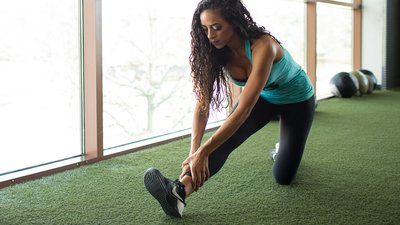If your body feels like it got hit by a truck after finishing up a workout, maybe it's time to learn what you can do to help prevent, or at least minimize, post-workout soreness.
Many people, especially beginners, consider soreness a kind of rite of passage into the world of serious lifting. But, when not being able to lift your arms or rise from bed limits your ability to work out, you need to find ways to feel less sore.
Of course, some degree of soreness is generally fine—it shows you've challenged your body in a new way—but being too sore to move doesn't do much for your progress.
Here are five changes you can make to keep soreness manageable.
1. Don't Avoid Exercise, Just Do It Lightly
Many people think that the best way to quickly overcome soreness is to rest as much as possible between workouts. This is a great excuse for someone who is so sore they don't want to move at all, but the last thing you want to do is avoid exercise.
Getting up and moving around can help increase blood circulation to the sore area, which can reduce inflammation and speed the healing process.

Whatever exercises you choose to do, just keep the intensity on low. What you need at this point isn't a big workout. Instead, try something more along the lines of active recovery, like a brisk walk, an easygoing bike ride, or a light yoga class. These types of exercises are great for working though the soreness.
2. Before You Leave the Gym, Stretch It Out!
After you finish the last set in your workout, do you tend to just rush off and hit the locker room? Next time, find an area in the gym where you can stretch, then stay there a while.
Post-workout stretching helps release muscle tension and the accumulation of lactic acid that leads to soreness. Stretching may not help you avoid soreness entirely, but it can reduce it, making your next workout less painful in the process.
Plus, a regular stretching routine is a great way to improve your range of motion (ROM), which helps you out in the weight room. When you're able to move through an exercise's full ROM, you can reap the full benefits it has to offer.
A good stretching session takes 10-15 minutes at the end of your workout. Once you see how much better you feel, you'll be hooked!
3. Follow Up Your Workout with Smart Supplementation
After you've finished stretching, it's time to get some nutrients into your body. You may already know that your post-workout protein shake accelerates muscle repair, but did you know it also can help reduce soreness?

As reported in the Journal of the International Society of Sports Nutrition, a team of researchers separated study subjects into two groups. For 14 days, they gave one group a whey protein isolate supplement with meals while the other group got a carbohydrate supplement.
Blood tests conducted after strength training workouts showed that the group with the whey supplement had lower plasma lactate dehydrogenase levels than the carbohydrate group.[1] Lower lactate levels indicate that those who took the whey experienced decreased overall muscle damage—which would lead to less soreness.
4. Get Your Pre-Workout in—With Caffeine
If you want a boost to get through your workout session, a good pre-workout can do the trick. These products are designed to increase mental alertness, improve focus and determination, enhance energy levels, and stimulate metabolic rate. They may even improve your body's ability to burn fat.
And, if it contains caffeine, a pre-workout might just help curb muscle soreness, too. Research published in the Journal of Strength & Conditioning Research compared athletes who consumed caffeine before a workout to those receiving a placebo. Those who had taken caffeine showed significantly lower levels of pain in the days following the trial, compared to the placebo group.[2]
Just keep in mind that too much caffeine can keep you awake at night, and getting enough sleep is important to the recovery process. Find that sweet spot where you are taking enough caffeine at the right time to get in a great workout, but not so much that it interferes with your sleep.
5. Try Some Tart Cherry Juice!
Finally, have some tart cherry juice before your next workout session. In a study published in the Scandinavian Journal of Medicine and Science in Sports, researchers looked at the effect of tart cherry juice on marathon runners.

Half the group of 20 runners drank tart cherry juice the day before the marathon, and for 48 hours afterwards. The other half drank a placebo. The group that drank the cherry juice was able to recover isometric strength faster than the placebo group.[3]
This suggests that tart cherry juice has antioxidant properties that support muscle function and recovery, as well as reducing muscle soreness.
Reference
- Cooke, M. B., Rybalka, E., Stathis, C. G., Cribb, P. J., & Hayes, A. (2010). Whey protein isolate attenuates strength decline after eccentrically-induced muscle damage in healthy individuals. Journal of the International Society of Sports Nutrition, 7(1), 30.
- Hurley, C. F., Hatfield, D. L., & Riebe, D. A. (2013). The effect of caffeine ingestion on delayed onset muscle soreness. The Journal of Strength & Conditioning Research, 27(11), 3101-3109.
- Howatson, G., McHugh, M. P., Hill, J. A., Brouner, J., Jewell, A. P., Van Someren, K. A., ... & Howatson, S. A. (2010). Influence of tart cherry juice on indices of recovery following marathon running. Scandinavian Journal of Medicine & Science in Sports, 20(6), 843-852.

